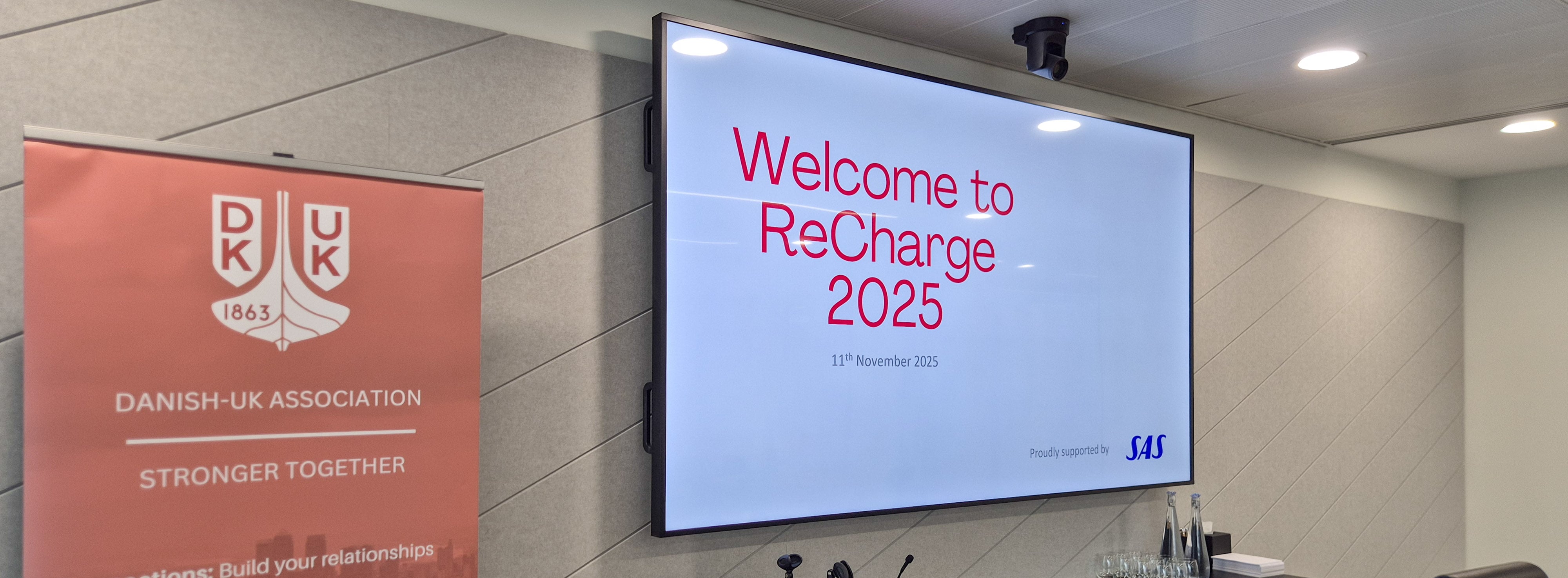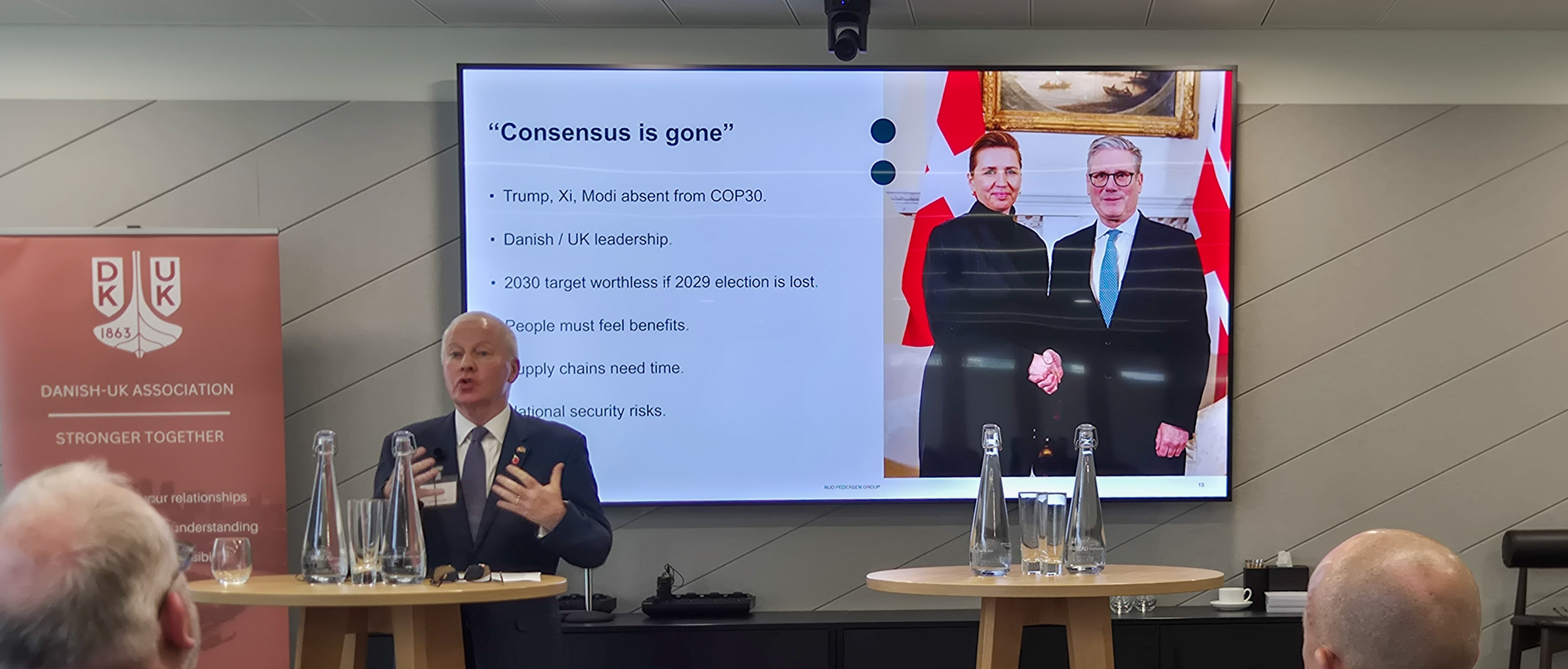Recharge 2025: A Day of Energy, Insight, and Collaboration at the Heart of London
On 11 November 2025, the EPConsult Energies team joined industry leaders, policymakers, and innovators at Recharge 2025, held at Gowling WLG, London. Organised by the Danish-UK Association (DKUK), the energy sector conference brought together the people shaping the UK's and Europe's net-zero future—a day filled with clarity, challenge, and collaboration.
At 11 o'clock sharp, everyone in the room paused for a moment of silence for Remembrance Day—hundreds of professionals standing together in stillness before resuming the discussions on how to build a better, more sustainable world.
Setting the Tone: Connie Hedegaard's Call for Focus and Urgency
The opening keynote came from Connie Hedegaard, former European Commissioner for Climate Action, whose trademark energy and precision instantly set the tone for the day. Her message was both inspiring and unflinching: the energy transition must not only be about ambition but also about delivery, about making sustainability part of competitiveness, not its opposite.
Her energy carried through every session, framing the conversations that followed—from renewable energy infrastructure to innovation and global climate leadership.
Public Ownership and Strategic Independence in UK Energy
Professor Juergen Maier FRS CBE, Chair of Great British Energy, expanded on what public ownership can mean for the UK's energy resilience—a model familiar in Denmark, but still relatively new in Britain.
He called for stronger investment in nascent technologies, long-duration energy storage, and floating offshore wind, while warning against the risk of handing innovation entirely to global competitors.
"Are we going to give everything to China?" he asked. "We must stay competitive while collaborating—it's a tricky balance."
He also highlighted Great British Energy's 'local energy out of the box' vision—creating distributed, community-scale power systems that build resilience from the ground up.
Infrastructure, AI, and Micro-Grids: Critical Energy Access
The first panel brought together diverse industry voices to discuss critical access to energy and infrastructure.
Marcus Walker of Able Group emphasised that "nothing works without water, energy, and ports"—the three pillars of industrial strength.
Lewis Richards from Microsoft explored the accelerating role of AI in infrastructure planning, noting how rising digital demand and data-centre growth are stretching resources such as water and key materials, often far beyond public awareness.
Elisa Antares Paoli of Plexar Energy introduced a fascinating look into AI-driven micro-grids, demonstrating how intelligent energy management can turn decentralised systems into powerful engines of efficiency.

Is Britain Still Open for Business? UK Energy Policy and Political Realities
A pivotal moment came when Jon Aarons from Rud Pedersen UK took the stage for a frank political temperature check, titled "Is Britain Still Open for Business?"
On one of his slides, a single line captured the mood: "Consensus is gone."
He pointed to a world where:
- Trump, Xi and Modi are absent from COP 30
- The 2030 climate targets mean little if the 2029 election is lost
- People must feel the benefits of the energy transition
- Supply chains need time, and
- International security risks are shaping market realities
And yet, his conclusion was both optimistic and defiant:
The UK is a Green Business Hub.
With 14 GW of offshore wind already installed, a Denmark-UK energy partnership that remains essential, and a new Labour government pledging to become a "clean energy superpower"—doubling onshore wind, tripling solar, and quadrupling offshore wind capacity—the country's direction of travel is unmistakable. Carbon capture and storage (CCS), hydrogen, nuclear, and a long-awaited grid upgrade are all part of that evolving landscape.
Building on Global Experience: Green Corridors in Emerging Economies
One of the key roundtable discussions of the day focused on "Creating Green Corridors in Emerging Economies." Anchored in the groundwork laid through EP's collaboration with the Mærsk Mc-Kinney Møller Centre for Zero Carbon Shipping, the session explored how green shipping corridors can move from concept to implementation in developing regions—when the right partnerships are forged early.
As participants rotated through the session, the dialogue moved organically—from sharing solution stories to exploring real-world constraints. We also reflected on EP's recent European Energy & Infrastructure Study Tour, highlighting our experience working with governments and agencies across different markets, and the universal need for long-term planning and volatility-resilient energy strategies.
Leadership in the Clean Energy Transition
The day concluded with powerful discussions on risk management, shareholder confidence, and industrial leadership—with speakers from Ørsted, Aarsleff, Gowling WLG, and the University of Cambridge Institute for Sustainability Leadership.
As the event drew to a close, Connie Hedegaard returned to the stage with a compelling final message: policy needs partnership. Policymakers, she reminded us, can’t always identify challenges on their own — it’s up to industry leaders to bring the real issues forward, to share their insight, and to collaborate on solutions. “They need your help,” she said — not just to react, but to co-create the frameworks that will shape a workable, resilient net-zero transition.
It was a powerful reminder that progress doesn’t just depend on political will — it depends on dialogue.
